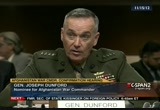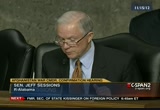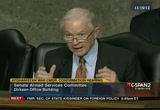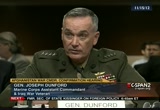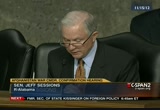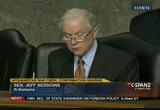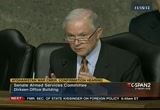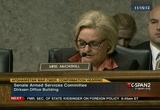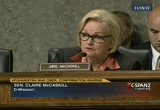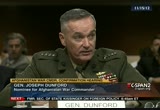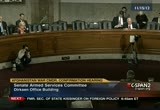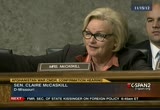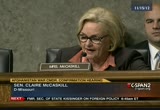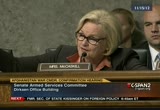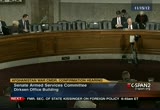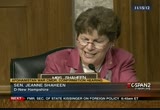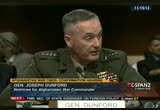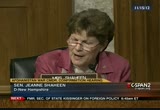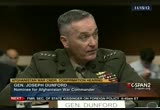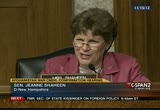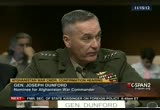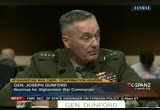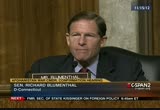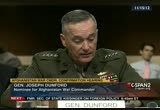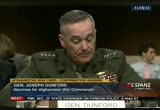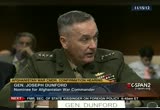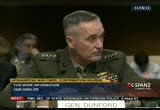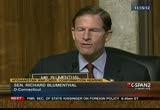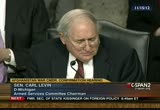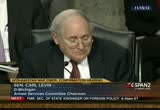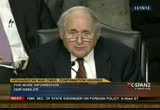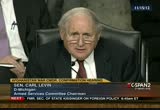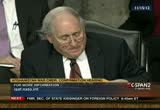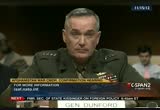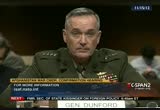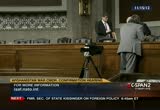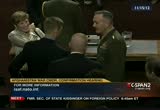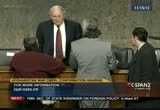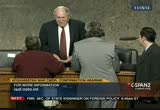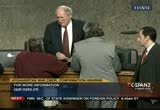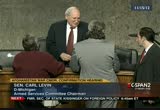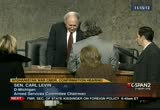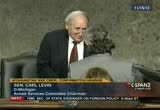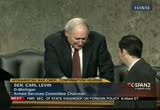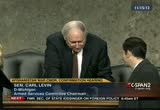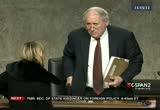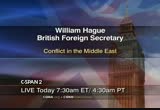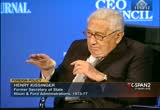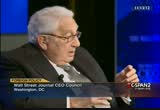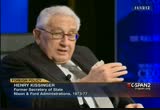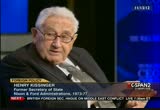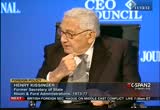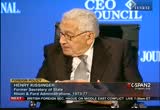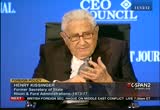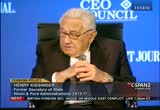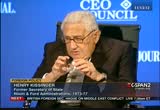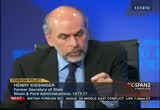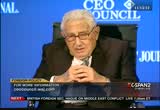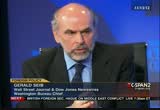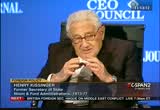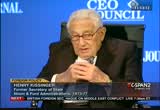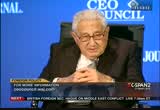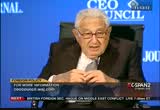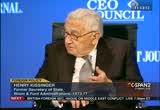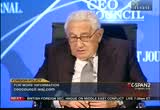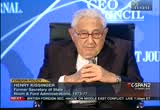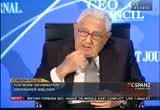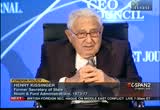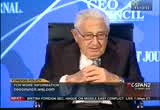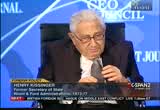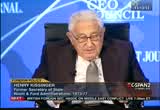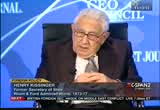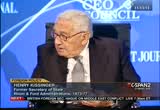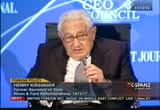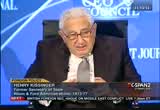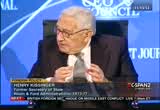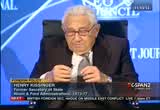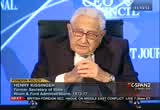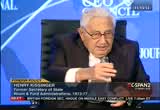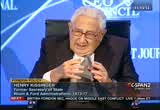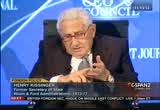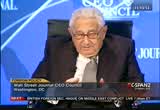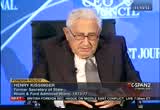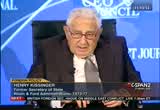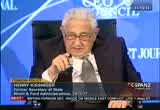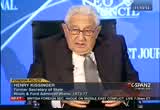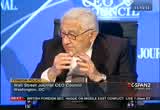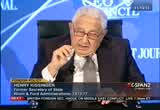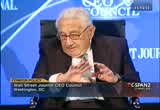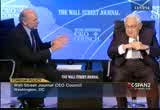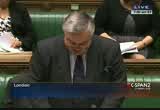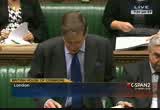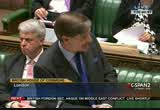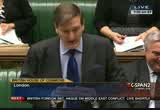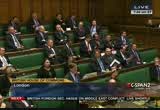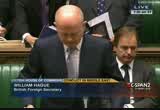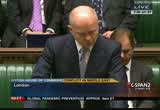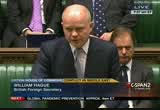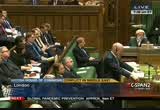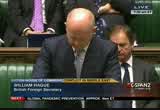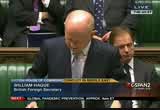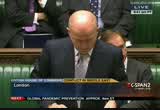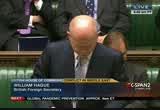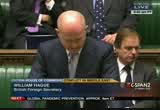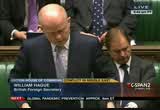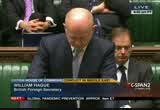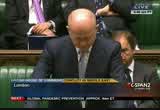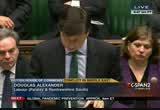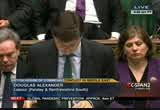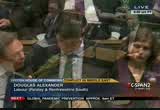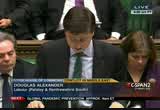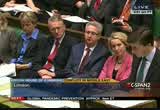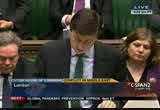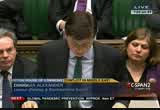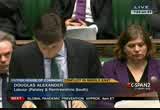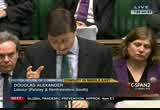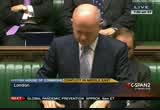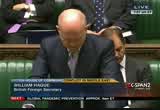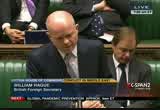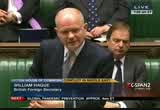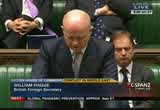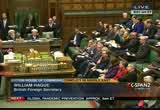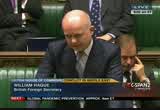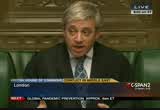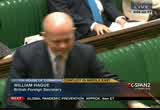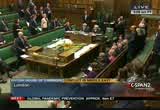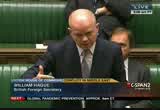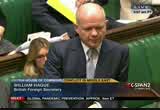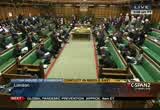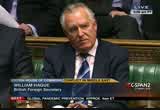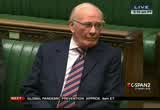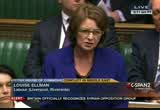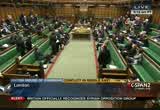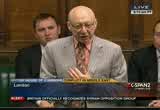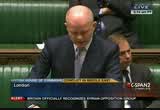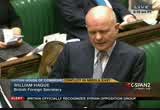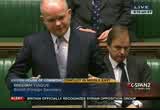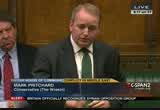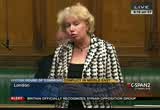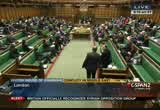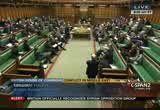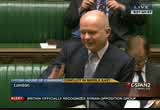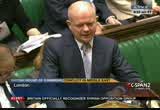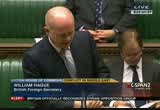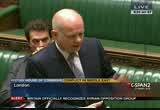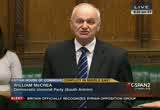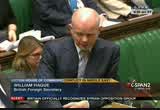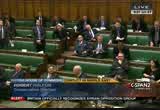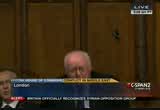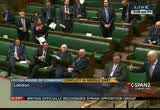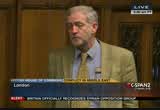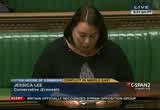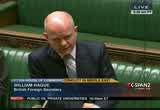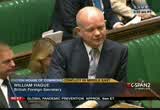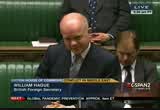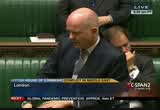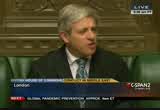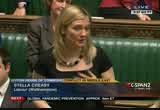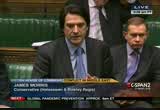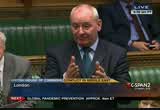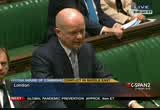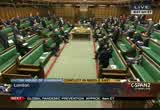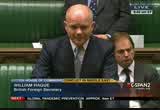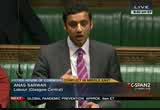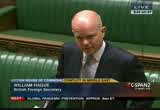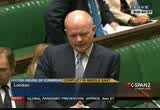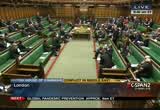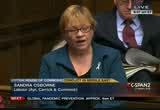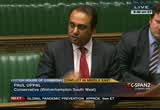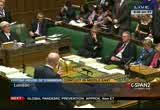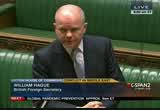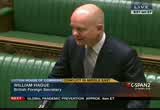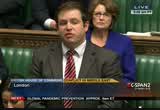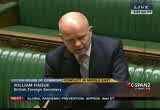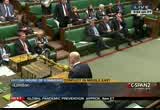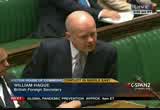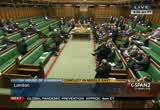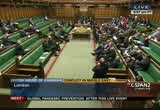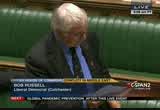tv Today in Washington CSPAN November 20, 2012 6:00am-9:00am EST
6:59 am
7:00 am
in the debates between the two candidate in terms of -- used interchangeably. if the dividing line is famous not have a nuclear weapon and then it will become nearly impossible to manage because that means they can continue to enrich plutonium at three levels that define nuclear capability, delivery systems, instrument capability, and warheads. the delivery systems are not a subject of negotiation. the question is whether the enrichment capability gets eliminated. drawing a line at the weapons,
7:01 am
the warhead development is not meaningful because from richmond to weapon, and our intelligence capability on that subject is so limited. negotiations are going on. the fact of bilateral negotiation between iran and the united states is a matter of grave concern to the sunni arab -- iranian nuclear capability, totally eliminated, where negotiations seem to be going, to establish some line beyond
7:02 am
and richmond will not take place and the conventional wisdom and that is if you permission and richmond beyond a 5% level you are close to a military enrichment capability. so to negotiate with iran, and secondly, how do you handle the enrichment problem? on the question of whether one should negotiate with iran at all, it seems to me the point of that is to enrich indicated that it might take action in a six months period. we have said that no option is off the table in preventing the enrichment, the enrichment
7:03 am
proceeding at a pace that makes the debate potentially irrelevant. it means from negotiation has to be attempted. if we are prepared to go to war on that issue, we need to go through this process. we have limited time. has to be done within 2013 or the technological progress in iran is out of the event and understand that if we cannot stop the enrichment we then will be living within a nuclear iran and the consequences in the
7:04 am
spread of nuclear technology, increased likelihood of some nuclear weapon being used at some point. the loss of credibility for ten years, it is unacceptable in the u.n. cannot define what you mean by unacceptable. those will be what will have to be applied. >> let me ask you two other questions, one narrow and won broad. >> fight that battle over whether we can negotiate or not. because we come to the point of what to do about the program and we need to demonstrate a level to find a diplomatic solution. >> negotiation --
7:05 am
[talking over each other] >> we cannot afford open-ended negotiation. >> the negotiation of some kind is necessary. >> whichever option you favor. this >> let me go northwest to syria. syria was discussed in the presidential campaign but the more it was discussed there and less difference there seemed to be between the two candidate. it came down to should we be arming the opposition? let me ask that question in a broader context? should we are mccumber opposition and whenever answer to that question is what is the strategic approach to the syrian conflict that preserves or protect american interests at this stage? >> let me begin and that end. the american international -- american position on foreign affairs was for in the aftermath
7:06 am
of the second world war, the united states had a position of predominance that was unique in human history and transitory as other nations developed that degree of pre-eminence. at the same time the single most powerful country in the world, and the key to stupidity in many regions and the key to progress in many regions and when you say you are no longer preeminent you have to be able to establish priorities and when you establish priorities you have to begin with an analysis of what the problem is.
7:07 am
now, the way the issue of syria has been presented, a ruthless dictator killing his own people. and obligation to prevent that killing by overthrowing the dictator and establishing a democratic government. with all my respect for and affection for the editorial page of the wall street journal, and have great respect and affection, i do not think that is correct, for what is existing in syria. to begin with, i think has that
7:08 am
started out, not so much -- somebody is chosen by and craig quest for power, he doesn't choose optimum. as a profession. and exo he got in because it is a ruthless brother was killed in an automobile accident but he certainly had committed many outrageous acts but fundamentally this is a conflict for the predominance among ethnic and religious groups
7:09 am
inside syria. governing 13% of the population but tacitly supported by most of the minorities and other groups that exist ticos' they are afraid of sunni predominance. if you put all minorities together there are close to 50% of total likelihood is if any one group dominates syria it will govern by methods comparable to those of the other words. i talked to a christian leader a few weeks ago and what he is aspiring to is to have autonomy
7:10 am
for all the various groups and a sort of weak central government, something like the lebanese. so when i ask myself what is in the american national interest in syria, it is in our national interest that the support of the shia in lebanon by syria interrupted and syria not become a base and protection of iranian policy and from that point of view assad's victory in the
7:11 am
civil war would be against the american national interests. from that point of view it is desirable to -- if you look at the performance of the rebels up to now, we have to be careful not to repeat in syria what we did in afghanistan of ethnic groups if they achieve total victory, a significant sash of their own -- extremely complicated. i am opposed to using american ground forces or american military forces except for the objective of weakening the
7:12 am
iranian position and engage in diplomatic activity, i would aim -- >> let me ask my final question and i will open and up. on a broader point you started to touch on which is fair to say we have seen a wide variety of american leadership roles or attempted leadership roles in the last decade. i am curious how you would define the proper leadership goal for the united states at this point at the beginning of the 20 first century? how do you define the role of the u.s. what to play and how we are playing the role now? >> let me set up from a negative. i have seen -- involved in four wars that we started with great enthusiasm and almost total
7:13 am
support and did not know how to end which turned into a debate about the speed of withdrawal with no other outcome. i was involved directly in the vietnam war. most damning of charge in public debate was victory as if it is a simple effort when you engage in war so let's start from the premise that we must develop a policy wherewith we engage ourselves we prevail and i would therefore taylor this to genius that means also a vision of our
7:14 am
7:15 am
operations risking cohesion and capabilities. how you apply that into a situation i don't know precisely but i do think we need a strategic concept of that nature. secondly -- when you take -- you must have some national interest in an academic context or dinner party context is quite unacceptable but you have to be -- begin with that. you can define national interest broadly. you can say it must have many moral elements but we need
7:16 am
diplomacy and strategy in which we can measure what we are attempting to do and what our resources are in relation to it. the outcome, new energy pattern on the front page of the newspaper today, it is going to print a change of strategic priorities for many countries in the world. the question of containing
7:17 am
china. it is a permissible and desirable objective of american foreign policy to prevent any nation from dominating a continent, but it does not need to be done by the methods of the cold war. the question this what can be created in which china and we can operate--with our military success so this is a very general way of putting it. >> keep coming back to china. >> i would also apply edge -- >> questions to editor she mentioned the cold war. the request and asking what role does russia play in the world
7:18 am
going forward. >> it is -- in a challenge of the finding its identity under totally different circumstances. russia has been an imperial power and it has had domestic support by its efforts in asia, the middle east and europe, depending on where it was, now russia has the problem of a declining population. declining russian population and muslim population that is forward of the muslim world. 3,000 miles from china which is based tricky dick nightmare in
7:19 am
the sense that there are thirty million russians are on one side and 1 billion chinese on the other end the middle east which is an ideological nightmare and in europe, a historically difficult one for them so how -- and yet the image russia has of its leadership is that they have to be considered as a principal country in order to be taken seriously so fundamentally russia has to look for a pattern of cooperation but found methods
7:20 am
of doing it but russia is not strategic to the west, bringing pressure on its neighboring countries of ukraine -- and it will want to cooperate ukraine into its own system, but i must say, independent ukraine is important for the peace of europe, many of the western countries to the ukraine, pressuring and all the time about its domestic situation is not necessarily compared with a recognition of the need to keep
7:21 am
ukraine autonomous. that is in addition -- basically economic problems--it becomes unmanageable and has not yet managed to create an alternative in that phase so i would think that the major problems of russia to develop a broader base for its economy to develop a concept of security and other than intimidation of its environment. hy was meeting place with a group of people described as
7:22 am
reformers in russia and many of the proposals of the strategy and so forth that the meetings, all of this means you want a democratic system and you are crazy. >> another question about china. the question is is there some level of corruption in chinese politicians inevitable and is there some level that is acceptable to the party and the problem lying ahead is above the threshold? >> it was primarily corruption. it was primarily an attempt to
7:23 am
achieve pre-eminence or eminence of side -- outside the established patterns where progress is made within the party because if he succeeded with population methods it would change the structure of the party and some sense of corruption as well. there's some level of corruption acceptable? outside -- every indication is for there will be demonstrative efforts to curtail corruption. the second question, i think they will succeed but it will be
7:24 am
-- >> another question from the group. with the u.s. becoming increasingly self-reliant in regard to oil and natural gas how should our continuing role in the middle east be defined politically and militarily? does it change as a result? >> it used to be axiomatic that upheavals in key countries of the middle east that affected the supply might involve -- this will have to be studied. from the point of view of energy supplies are interest in the middle east will diminish and over a period of 10 to 15 years,
7:25 am
the strategic interests of countries like china and india in the middle east will increase and the role they will attempt to play is bound to increase because their supplies still become imported from at the same time, given the importance of the islamic world and what will accumulate in the region, continues to add interest in stability the new security team will have to do to make nontraditional assessment of heart they imagine the evolution -- and some of this will depend on the outcome of the election
7:26 am
over the period of 10 to 15 years iran emerges as a country conducting normal publicity and will continue to be a country influenced with theological evolution. but that will be -- i expect china and india will become more active players in the region >> i will take the brunt of and ask one last question. we were talking earlier outside about a new country on the american foreign policy agenda, me and mar burma. president obama is going there. something is happening. is it important? how does it matter?
7:27 am
>> burma is a country with a large population of potential resources, racked by a military government for a period. it is arranged between indy and china and southeast asia so it plays an important strategic role. and china has been playing a considerable role because it was one country that has dealt with me and mark --myanmar. the evolution of me and mark m --myanmar into a more prepared state is a positive strategic development.
7:28 am
at the same time, we have to keep in mind the impact of the various regional groups in myanmar and other countries and also internally and i would warn against false enthusiasm in trying to push myanmar too rapidly into changes they may not be able to sustain and may break loose on their own. the administration policy in myanmar has been successful and moving in the right direction.
7:29 am
preeminent and attempt as part her heart if you say we're doing well and should moderate our place it is a pretty good position to be in. i am in favor of the president going there. >> don't get carried away is what you are -- >> i think it is three month to somewhat two months. >> a good lesson for life it seems to me.
7:30 am
but anyway, 45 minutes tour of the world with henry kissinger. i can't think of anything i would rather spend my time doing. i want to thank you for taking time to share with us and dino everyone in the audience is grateful. we appreciate it very much. [applause] .. >> the house of commons is working on other business. >> this is an important point, that the crown prosecution service is currently considering its policy in respect of how it
7:31 am
shares information with other relevant agencies, and it is, of course, very important that disclosures, information which may be helpful in protecting a vulnerable person, that should be shared where possible, and it's certainly a process which the attorney and i feel should be looked into, but extremely carefully and in a positive way. >> mr. henry bellingham. >> number 10, sir. >> i've appointed a new director of fraud office who started work in april. david greene's restructured the office, made high-profile appointments, he's clearly restated the intents and purpose of the sso, and i'm confident of the result we will see improved efficiency and performance. i have also today place inside the libraries of both houses the report of the inspection of the serious fraud office by the inspect rate which i had requested. i'd like to thank the chief inspector and his team for this helpful report. i can confirm that the new
7:32 am
director is already implementing them. >> mr. henry bellingham. does he agree with me that the sfo does have a vital role to play in the drive against crime around corruption and bribery? does he also agree with me that u.k. exporters in particular must know where they stand, and today must be treated fairly, and would he agree that the current guidelines fit the purpose, and can he confirm there will be no major or fundamental changes made to those guidelines? >> attorney general. >> well, so far as bribery and corruption are concerned, they are serious offenses, and there have been guidelines published to help companies in this respect. i have every confidence that no company is going to be prosecuted which has not, in fact, committed a serious offense. but that said, i certainly can't give an undertaking that the guidelines may not be subject to review. the guidelines will evolve over time, and they are just that, guidelines.
7:33 am
ultimately, it is for the director of the serious fraud office and the director of public prosecutions to make decisions based on the public interest. >> mr. thornberry. >> two weeks ago we were astounded to learn that the former chief executive of -- [inaudible] had received an unauthorized sendoff of 340,000 pounds for just two weeks, two years in the post. and last week we learned that the outgoing chief operating office struck a confidential deal on similar lines offered to ms. williamson. now, regarding the second payment, what is the scale of it, and can it be stopped? regarding both payments, who knew about them and when? is this negligence, incompetence or a deliberate bypassing of the or system, and finally, what guarantees can the attorney general give us that he's no longer asleep at the wheel? [laughter] >> well, may i first of all say to the honorable lady that i had
7:34 am
no -- [inaudible] and nor has anyone in my office of the irregular payments that were made. they came to light subsequently on the appointment of the new director, and they are a matter of great concern to me, all the regular payments are a matter of concern. i'm satisfied the director has put in place, the new director, all the necessary measures to insure that such a matter won't occur again. she also raised detail about states, and i'd be very happy to write to her so that she should be paid aware of exactly when the matter came to light. and i will also make sure that the point she raised about the director as well. >> will my honorable friend assure me a that if a request is made for the sfo, that it will be met favorably by the government? this. >> attorney general?
7:35 am
>> i can reassure my honorable friend that this matter has already met with a favorable response from the government in terms of insuring that adequate funds are made available. of course, my honorable friends and colleagues in the treasury will want reassurance that money is being well used, but i'm quite satisfied that the money and resources are available to the sfo, and i'm also quite satisfied, and the director's satisfied he has the fess resources to carry out this investigation. >> secretary of state for foreign and commonwealth affairs, secretary william hague. >> mr. speaker, with permission, i will make a statement on gaza, the middle east peace process and syria. the whole house will be united in concern both at the intolerable situation for the residents of southern israel and the grave loss of life and humanitarian in gaza including the particular impact on children. on the 14th of november, the
7:36 am
israeli defense forces began air strikes in response to a sharp increase in rocket fire. hamas and other militant groups responded with other rocket fire. as of today, three israeli citizens have been killed and at least 109 palestinians including 33 women and 26 children -- 11 women and 26 children also killed. we have made clear that hamas have the principal responsibility for the start of the current crisis but also that all sides have responsibilities. we quickly called on israel to seek every opportunity to de escalate their military response and to observe international humanitarian law and avoid civilian casualties. yesterday e.u. foreign ministers condemned the rocket attacks on israel and called for an urgent cessation of hostilities. we have also warned that a ground invasion of gaza could length b the conflict, and erode
7:37 am
international support for israel's position. we wish to see an agreed ceasefire that stops the rocket attacks and ends israeli military operations. efforts are continuing as i speak, and the u.n. security council will continue discussions on the situation today. more open access in and out of gaza is part of any longer-term solution. we pay tribute to the efforts of the egyptian government and the u.n. secretary-general to secure a ceasefire and have supported these efforts over the last few days. i discussed these with the egyptian, israeli and turkish foreign ministers over the weekend as the prime minister did with prime minister netanyahu and president por si. my honorable friend, the undersecretary of state, is in ramallah today where he will meet president abbas after visiting israel yesterday. there is no military solution to the crisis in gaza or to the israeli/palestinian conflict.
7:38 am
peace becomes harder to achieve with each loss of life and the creation of facts on the ground. the only way to give the palestinian people the state that think need and deserve and the israeli people the security and peace they are entitled to is through a negotiated two-state solution, and time for this is now running out. this requires israelis and palestinians to return to negotiations, israel to stop illegal settlement building, palestinian factions to reconcile with each other and the international community -- led by the united states and supported by european nations -- to make a huge effort to push the peace process forward urgently. while there is any chance of achieving a return to talks in the coming months, we continue to advise president abbas against attempts to win palestinian observer state status through the u.n. general assembly. we judge that this would make it harder to secure a return to negotiations and could have very
7:39 am
serious consequences for the palestinian authority. our collective goal must be a two-state solution based on 1967 borders with agreed land swaps, jerusalem as the capital of both states and a just settlement for refugees. so while we support palestinian aspirations and understand the pressures on president abbas, we urge him to lead the palestinians into negotiations and not to risk paralyzing the process. but we also urge israel equally to make every effort effort to t negotiations before the window for a two-state solution closes altogether. the urgency of all of this is underlined by the conflict in syria. the whole house will join me in condemning the barbaric violence by the assad regime which continues its aerial warfare. 30,000 people have died already, and more than 100 are still being killed each day, countless homes, clinics, hospitals and
7:40 am
essential infrastructure such as water and sanitation systems have been destroyed or severely damaged, and between one and three million people displaced from their homes. there are appalling reports of rape and sexual violence by government forces and militia and as a form of torture in regime detention centers which the u.n. human rights council commission of inquiry could be prosecuted as crimes hens humanity. -- against humanity. and there are now over 400,000 refugees in neighboring countries. 50% of all syrian internally-displaced people and refugees are children. we are increasing our humanitarian assistance as the crisis grows and winter approaches, and our appeals to other members of the international community to give far more relief to u.n. relief efforts have been intensified. our 53.5 million pounds in humanitarian assistance so far includes 9.7 million for the world food program to feed
7:41 am
80,000 people inside syria each month, 4 million pounds to provide shelter and basic relief items, and 9.7 million pounds for medical services and supplies, food parcels, water and sanitation services, distribution of blankets and hygiene kits. in the neighboring countries we've given 10 million pounds to provide shelter, protection, registration and water/sanitation services to refugees, 5 million pounds to the world food program to feed 20,000 people and 6 million pounds to unicef to provide education and trauma support for children and water and sanitation services. in cairo last week i called on other countries to increase their contribution to the relief effort which the u.n. has described as critically underfund. however, what is urgently needed is a political transition to new and legitimate leadership that reflects the will of the syrian people and that can end the violence and begin to rebuild the country is regional and international support.
7:42 am
on the 13th of november, there was a major breakthrough in doha with the establishment of syrian and opposition forces which has been welcomed by many syrians. last friday i met the president and two of the vice presidents of the national coalition on their first visit to europe. i sought assurances from them in three areas. first, i urged them to commit themselves to gone -- build their political structures. second, i encouraged them to use the next friends of syria meeting -- which we hope will be held in morocco next month -- to set out a plan for syria's future in detail. >> and third, a clear commitment to international humanitarian law including the protection of all religious communities and unfettered access for humanitarian agencies. in response, they stressed their determination to build on the doha agreement and to leave the
7:43 am
door open for other opposition groups to join them. to be a moderate political force committed to democracy and not to repeat the abuses of the assad regime. they told me that their priority was protecting the civilian population against attack and focusing on achieving a political transition. it would be for the people of syria, they told me, to approve a future government, these are important and encouraging statements by the national coalition. they have much to do to win the full support of the syrian people and to coordinate opposition efforts more effectively, but it is strongly in the interests of sur yarks of the -- syria and of the united kingdom that we support them. on the basis of the assurances i received and my consultations with european partners yesterday, her majesty's government has decided to recognize the national coalition of syrian revolution and opposition forces as the sole legitimate representative of the syrian people. as the president of the national coalition said to me on friday,
7:44 am
recognition imposes responsibilities on the coalition, and we will continue to press them to uphold their commitment. i can also announce a significant increase in practical support for the syrian opposition by the united kingdom. first, we will invite the coalition to appoint a political representative to the u.k., and we will offer support to them as they set up their political and humanitarian structures. second, we'll provide a million pound package of communication support which could include mobile internet hubs and satellite phones to improve their ability to communicate inside sirna. third, a -- syria. third, to develop its plan to meet people's basic needs in opposition-held areas, and this team will draw up recommendations for areas for further u.k. assistance. fourth and separately, my right honorable friend, the secretary of state for international development, is looking at increasing our assistance to syrians affected by the conflict. this could include increasing
7:45 am
our humanitarian medical assistance for wounded syrian civilians by providing u.k. funding for hospitals and mobile clinics and training for health workers. and we intend to launch new work to support victims of sexual violence in syria. this new package of support is around 2 million pounds of immediate comment. this comes on top of the training of citizen journalists, human rights advocates, doctors and syrian advocates we have provided and the equipment and water purification kits for unarmed groups that i announced during the summer. alongside the increased political and practical support, we are pressing the e.u. to increase its support to civil society in syria. we will continue the e.u. sanctions including seeking accountability through the u.n.'s commission of inquiry. we also expect there to be
7:46 am
discussions in nato in the coming days about supporting turkey, and we will continue to work with all of syria's neighbors to help them mitigate the effects of the crisis. and we will step up our support for political transition and our planning for the day after assad. finally, we will continue to support the work of the u.n. and arab league envoy who i met a few days ago in cairo and renew our efforts to persuade russia and china to work with us at the u.n. security council. i will take every opportunity to urge my russian and chinese colleagues to support the political and diplomatic solution to the conflict in syria. without such a solution everything that they and we most fear is coming closer, including ever-greater loss of life, instability in neighboring countries and an opportunity for extremists to pursue their own ends. the basis for such a political settlement is clear: a credible alternative to the assad regime is emerging that has the growing
7:47 am
support of the arab league, the european union, the united states and an in's cooing number -- increasing number of countries, and we have an agreed basis for transition which all permanent members of the u.n. security council signed up to in june. but in the absence of that political and diplomat you can solution, we will not rule out any option, and in accordance with international law where it might save innocent lives in syria and prevent the destabilization of a region that remains critical to the security of the united kingdom and the peace of the whole world. >> douglas alexander. >> mr. speaker, let me thank the foreign secretary for making the statement and -- [inaudible] today. mr. speaker, i will first address the issue of syria and the announcement that the foreign secretary made in his statement. i wish b to note my recent visit to the saw tarry refugee camp in jordan which has been appropriately registered. only an inclusive transition
7:48 am
plan as we've just heard from the foreign secretary holds the prospect of being a bridge between conflict and a sustainable peace in syria. until now not only has the security council been disastrously divided, but so, too, has the syrian opposition. over many months the russians have continued to -- [inaudible] so if assad goes, what comes next? on the 11th of november, however, we saw the establishment of the new commission in doha. last week we on this side of the house called on the government to recognize the new syrian national coalition, so i, therefore, welcome today's announcement by the foreign secretary that the british government has now taken the decision to recognize them as the sole legitimate representatives of the people. recognition is a vital step forward, but can the foreign secretary tell us whether he now intends to use this newfound
7:49 am
unity as a fresh approach to the russians? we are clear that the correct focus for the u.k.'s efforts in the days and months ahead on syria must be helping unify the syrian opposition, not helping arm the syrian opposition. so can the foreign secretary give this house a guarantee that the recognition of the syrian national coalition is not a precursor to arming the syrian opposition fighters, which he must also acknowledge would be against the european arms embargo currently in place? mr. speaker, the political process must not distract us from the humanitarian crisis. i saw myself the sheer scale of the human suffering that has a devastating consequence of this war in syria. and as wasn't approaches with over two and a half million of syria's 23 million people now displaced and ngos warning that 200,000 syrian refugee children are at risk, action is needed.
7:50 am
i, therefore, welcome the announcement that the foreign secretary has made, that the british government will be increasing aid, but will he set out what specific sets he and his colleagues in government will be taking to encourage others in the international community to increase their support in the face of the growing humanitarian crisis to which he referred? there is still a significant shortfall in the funds for syria, and britain must do can its part to encourage partners to contribute to this inexcusable shortfall. mr. speaker, let me turn now to the issue of gaza. in common with the -- [inaudible] we abhor the loss of life that we have witnessed in recent days. the foreign secretary has reiterated today that principal responsibility for the start of this current crisis lies with hamas. of course the recent rocket attackings targeted on a civilian population deserve our categoric condemnation, but does the foreign secretary accept that while these rockets were the proximate causes, the deeper
7:51 am
causes reflect the failure over years and decades to achieve a two-state solution? every time a military solution is prioritized over a political solution, greater future problems are generated. indeed, there is and can be no military solution to the israeli/palestinian con nick. the israelis have stressed that their response is justified by the recent escalation of hamas rocket attacks, no civilian population should have to live in such constant fear. but does the foreign secretary recognize that acknowledging, as i do, israel's right to defend itself does not oblige the government to suspend government as to the wisdom of its chosen actions? be as a response to the rocket attacks four years ago, israel launched an operation in which 13 israelis and over 1400 palestinians were killed. the aim of the operation was, and i quote: destroying the
7:52 am
apparatus of terror. yet three years on, hamas are still in power in gaza, over a thousand missiles have been launched into israel this year, and just in recent days rockets have reached tel aviv and the outskirts of jerusalem. three us aillies and more than 100 palestinians, many of them civilians, have been killed. does the foreign secretary, therefore, accept that the scale of the casualties in gaza togetherring with the cometting blockade fuels hatred and emboldens those seeking to isolate israel internationally? the marginalization of the palestinian authority further diminishes the prospects of immediate negotiations and, indeed, palestinian unity and that hamas will undoubtedly claim itself to be the victors whatever the final outcome of the operation and, indeed, the negotiations presently underway in cairo? does he further accept that if the operating logic of hamas is
7:53 am
terror and the operating logic of israel is deterrence, then pleas for restraint are simply falling on deaf ears? we have on this side of the house were a number of days been urging not simply the strength, but an immediate cessation of violence. we have been clear that a full-scale ground invasion would be a disaster for the peoples of both gaz is saw and israel. -- gaza and israel. it would further damage the hope of peace and security. does the foreign secretary further accept that given reports of overflowing wards in hospitals and the prior degradation of those facilityings as a result of the blockade, it is urgent that the free and unfettered access is guaranteed for medical and humanitarian personnel? will he also set up what discussions he has held with the egyptians about humanitarian access and specifically iranian
7:54 am
missile technology not only during these volatile days of conflict, but also in the longer term? on saturday we on this side to have house called for a full-scale u.n. diplomatic initiative to end the violence. we urged the u.n. secretary to travel to the region and well that many that he has now done so because it will be vital in helping to bring this conflict to an end. past military angst -- action has failed to bring peace. alongside the suffering of the palestinian people. occupation and blockade is not a strategy for peace, it is a recipe for repeated conflict. talk of the middle east peace process ignores the fact that sadly today there is no peace, and there is no process. does the foreign secretary agree that the long-term security of israel will depend on its readiness to be as bold in seeking peace as it has been in using military force? at a minimum that means israel
7:55 am
must immediately end legal settlement expansion which is currently a key barrier to advancing negotiations. as labour, we would urge the government to reconsider its stated opposition repeated again today and support the palestinians' bid for enhanced status at the united nations. this is not an alternative to negotiations, but a bridge for beginning those negotiations. the foreign secretary in his statement argued, and i quote him directly, that recognition that the united nations could, and i quote, risk paralyzing the process. but when will he understand, there is no present process, there is only paralysis? there is continued legal settlement building, there are continued rocket attacks, there is continueed fear and anxiety, continued occupation, there is continued blockade, but there are no meaningful negotiations, and there have been no meaningful negotiations for a number of years.
7:56 am
the suggestion and enhanced recognition of palestinians could somehow imperil progress implies that progress is being achieved and, indeed, that a peace process exists. at present, sadly, neither statement is true. why doesn't he acknowledge this fact? after decades of failure, increasingly some are questioning whether a two-state solution is any longer possible. that is why it is vital within the international community amidst the undoubted despair and disappointment we encourage the palestinians to take the path of poll the ticks and reject the path of violence. we reach the hope that there is a credible route to a viable palestinian state and a secure us -- israel achieved by negotiations, and the british government amongst others has a heavy responsibility to advance that goal at the united nations in the coming weeks. >> here, here. >> mr. speaker, i'm grateful to the right honorable gentleman. while there is one difference between us over the u.n. general
7:57 am
assembly, i welcome his support and the fact that there is so much accord on so many of these summits. indeed, certainly taking them in the order in which he asked them, certainly on the subject of the new national coalition of the syrian opposition, um, as he said, he has called for their recognition. i very much wanted to look into their eyes and ask them the questions i set out earlier before the government gave that recognition, but i have done so, and i think it is right to do so. we have all across the house referred for a long time, as he has just done in his questions, to the need for a unified opposition and the absence of that in the past being one of the obstacles to peace in syria. now that they have done their utmost and made so many compromises to form a national coalition, it is right that we get behind them and that as much as possible the world gets behind them. so it is right for us to join in that, and we now look to them to fulfill the commitment that they have made. and we have taken no decision,
7:58 am
consequence upon that or no decision at all as things stand to change our policy on the e.u. arms embargo. we look at all options, as i've repeated again today. we rule out no options. it's the job of the national security council to look at all options, particularly as this crisis worsens. at the moment, it is going in the wrong direction. the crisis is getting worse. but we have taken no decision as things stand to change that policy, and we certainly are putting other nations under a lot of pressure, a lot of persuasion to increase the aid they're giving for the huge humanitarian suffering that i and he have seen on the borders of syria. my right honorable friend convened a meeting on this of many nations at the u.n. general assembly, some of them since then have increased their aid. i attended last week the meeting in cairo the meeting of foreign min ministers, and this was one of the main points i made to
7:59 am
them. those increased contributions, particularly from the arab world, will be necessary as winter comes and the number of refugees continues to increase. so i think i can readily agree with everything that he's said on that summit, and we will now, um, again as he was suggesting, of course we will use the fact that the opposition have come together in an unprecedented way to renew our diplomatic efforts with russia. if one of their objections is -- and it always has been -- that there isn't a single interlo cue to have on the opposition side, well that at least now has been removed. so the possibility of diplomatic process, and i stress that it remains the case the only real solution in syria is a diplomatic and political solution. neither side is anywhere near the military strength to overthrow or to remove the other side, and even if they did so, they would then be dealing for
8:00 am
generations with a deeply-fractured society. on the questions about -- i think it's also a lot of agreement, actually, on so many aspects of the middle east peace process which is that whenever a conflict like this occurs such as in gaza over the last week, it is vital to remember the wider picture. at the root of all this is the failure to make process on the middle east process. and while i think it's absolutely right as i have done to point to the increase in rocket attacks, the sharp increase compared to -- they've gone up steadily, actually, since the operation has produced this current crisis, it's also quite right, of course, to make very clear the need for improved access in and out of gaza, including for humanitarian assistance, including for trade to be able to proceed in and out of gaza. it is a mistake by israel to have such tight restrictions on
8:01 am
gaza. we've often made that clear. and i think on this question, one point of difference between us has been over the tactics of the u.n. general assembly, and i want to explain the reason for the d.o.t.'s position on this -- the government's position on this. time is running out for a two-state solution. we are not far due to unacceptable settlement building on the west bank in east jerusalem. we are not far from a two-state solution being impossible and unviable. and in my view this coming year with an israeli election coming to an end in january, with the u.s. election now over, with clearly time running out is an absolute, creately -- people always say it is a critical year, but if progress isn't made in this year, then it is not going to be made in all probability towards a two-state solution. and i think it's vital -- and this is the message we've given to the united states -- and they and we and major e.u. countries put our full weight behind that over the coming months. but we have to ask whether it
8:02 am
will advance that or make that easier or whether it will make it more difficult for a motion to be carried on observer status now at the u.n. general assembly. there is a perfectly respectable and legitimate case that things have gone on for so long, that palestinian san franciscoations -- frustrations are so intense that it would be can be -- [inaudible] all members can have different judgments. we will see over time what is the reality. if such a motion is carried, we must move heaven and earth, of course, to try to stop it retarding the peace process, to try to restart peace negotiations. our message to the united states will be the same but as things stand, the possible reactions of congress, the position of the palestinian authority could be
8:03 am
made worse by the passage of such a resolution. so we will use our votes in whatever way we think will keep up the best prospect of negotiations. we'll consult with our partners in the european union about it. i hope there will be a large measure of agreement on how to vote on this resolution, but that is the reason for our position on this, and it is one that has the best interests of palestinians, of the creation of a palestinian state at heart. we have to even when our heart and our head pull in different directions in international diplomacy, we have to give considerations to our head and that the best way to pursue that process is to put our full weight behind it in the coming months. >> order. inevitably, i've granted some latitude to the two front benches to enable them to treat all the various masses involved. in trying to accommodate the level of interest giving other pressures on time, it would help
8:04 am
if honorable and right honorable members would confine themselves to a single question, not covering all the terrain, a single, short question which will be followed, i know, by a typically succinct reply by the foreign secretary. sir peter tapsell. >> in view of the increasing gravity of the situation in the middle east, will my right honorable friend ask the leader of the house and mr. speaker if they will arrange a full-scale parliamentary debate in prime time next week on the middle east? with time limits on back bench speeches of not less than 15 minutes so that we can have a proper back bench debate and not a series of sound bites? >> well, i think that's a question for my colleague, i definitely lee it to the house -- leave it to the house. although it would be a tragedy
8:05 am
if my right honorable friend's comments were limbed to 15 -- limit today 15 minutes. [laughter] >> jack storm. >> thank you, mr. speaker. ing any concession made by the west to accommodate its position and then not only does nothing, but makes the situation worse, for example, by illegal settlement building. foreign secretary, why don't you please reconsider the decision of the british government's refusal to vote for this general resolution. i have to say he's a man of very great fluent si and normally convinces the house, but i simply find his answer as to why the british government is refusing to support this resolution utterly incomprehensible. it's not that i don't agree, it's that i don't understand why it could make the situation worse? almost certainly, surely, it would make the situation much better. >> will here, here. >> well, i always listen
8:06 am
carefully to the right honorable gentleman for obvious reasons, and the government has taken no decision yet about how to vote on this resolution. we are arguing against the holding of such a vote which would be carried in the united nations general assembly because of the number of nations in favor of it. and as i said, as i mentioned a moment ago, we will consult closely with our e.u. partners about that. most of them, i think from yesterday's discussion, have the same view that i've just expressed to the house, and there was a time when we used to place great weight on foreign ministers around the european union. so, um, they have all come -- that's the majority view for a reason, which is a genuine anxiety about whether it will be possible in the remaining, short window as i see it to restart the middle east peace process negotiations if that motion is carried now. so it is a tactical difference, a respectable difference of
8:07 am
opinion over it, but that's the ballot -- i come down on that side of the balance of that judgment. >> sir malcolm rivkin. >> does the foreign secretary agree that the emergence of the government's welcome recognition removes a major barrier to the supply of defensive military equipment to the syrian resistance? as the european union embargo is due to expire on december the 1st and as president orrland of france has said france is now willing to reconsider, will the foreign secretary look at this constructively, and will he recognize that what he described rightly as barbaric violence will not come to an end unless and until the syrian resistance are able to defend themselves? >> well, my right honorable friend has consistently made the case for the active arming by western countries of the syrian opposition. i've often pointed out in
8:08 am
response some of the disadvantages of that course of action. as i say, there is no, there's no automatic change in our policy on that because of of the recognition of the syrian p opposition. i've discussed these issues with the french foreign minister. the arms embargo that he refers to is due to be rolled over, due to be continued from december 1st as part of the entire package of syria sanctions and, of course, we would very much want to maintain whatever on the arms embargo all of those sanctions. so any changes to it would rely on subsequent amendment to that package, to the sanctions package overall. but there have been no requests from france at this stage to the e.u. to change that position. we will keep all these options under review, but we've made no decision to change our policy on arms supplies as things stand. >> mr. peter hayes.
8:09 am
>> surely he must accept that his specific and chilling refusal here today to rule out western british-backed military activity in syria is going to make disastrous policy even more disastrous. nobody can win in a civil war. assad's savage regime has the backing of at least a third of the population. it's a proxy also, the conflict for sunni v. shia, saudi arabia v. iran, the west v. russia and china. you've got to resolve this by political settlement, not by upping the military states. >> i think i made the point myself, mr. speaker, a few moments ago that there's only a political and diplomatic solution to this. but, however, it's also important to point out no one knows exactly how events in syria will proceed over the coming months or years. these situations, the one that arose in libya last year and a different one now in syria, are
8:10 am
unchartered territory in international affairs. and so it is foolish to rule out options when we don't know how those situations will proceed. it is right to give huge emphasis to diplomatic and political progress and humanitarian assistance that i've given in my statement. >> [inaudible] campbell. >> israel has an unambiguous right to defend itself. but along with such rights go duties. and in this case the duty is to use only proportionate means to affect that defense. does my right honorable friend believe that targeted assassination, the destruction of civilian infrastructure and the imposition of casualties on women and children is consistent with that duty? >> well, i think, of course, all our efforts have to be directed now to making sure there is a ceasefire, and i think it could only be at a subsequent stage that one could make the judgment
8:11 am
my right honorable friend is inviting me to make. having shied away from it in the past, in fact, from the opposition benches in the lebanon war, i was very clear about the disproportionalty of what happened. but in this case we have to ask ourselves whether any of this would be taking place, this current crisis, current conflict in gaza without the increase in rocket attacks which have gone up from 200 in 2010 to more than 1300 before this conflict began up til last week, this year. that clearly is an intolerable situation in the south of israel. and so we have to bear that many in mind as well. >> mrs. louise helmand. enter the fact that hamas is committed to the destruction of the state of israel, that in 2005 israel removed all of its 9,000 separate -- [inaudible]
8:12 am
soldiers from gaza, and the fact that that was followed by hamas in gaza firing thousands of rockets from civilian centers targeted at israeli citizens -- [inaudible] israel full support in defending its citizens against this aggression. >> here, here! >> well, we're rightly critical of israel when there are civilian casualties, but we have to bear in mind that for hamas or other groups firing rockets, their sole intention is to cause civilian casualties. that is the entire purpose of what they do. and we are right to stress the responsibilities on israel and the need to stop settlement building and restart the peace process. but also the responsibility on hamas to renounce violence, to recognize previous agreements, to recognize the right of israel to exist. such things would also be immense steps forward in the peace process in the middle east o. >> mr. richard ottoway.
8:13 am
>> over the weekend israel was widely condemned for a military strike in gaza in breach of the geneva convention. can you confirm, in fact, that it was a base for islamic jihad, and the only person who lost their life was the military commander? >> i can't. i hesitate to confirm the actual fact although, indeed, i've heard that, but i don't think i can definitively confirm that. certainly, the israelis explained that they were targeting a field ya center, targeting a different organization. we've also been in touch with the media organizations concerned, but i very much take the point that my honorable friend has made. >> general kaufman. >> isn't it interesting that when assad lethally represses the syrian people, he is the bad guy while when netanyahu lethally represses the
8:14 am
palestinian people, he is the good guy? and i wish it was good-bye. [laughter] and also that when the syrians respond with brutal force to that repression, they are the good guys while when palestinians respond with brutal force tock that repression, they are the bad guys. it's this kind of discriminatory attitude by the international community that will prevent there being peace in the middle east. >> as the right honorable gentleman knows, i've always got a great deal of time and respect for him, although i think in that question his tending toward the caricature of the situation in the middle east. i don't think that is the attitude of anybody in this house, there are responsibilities on all sides. and our response, the response of the western world is, yes, to give assistance to the syrian people in the face of this, but
8:15 am
it's also to give a huge amount of assistance to palestinians. the program is providing 359 million pounds, its current program, for humanitarian assistance including in gaza. and so we are trying to assist everyone in desperate need in the middle east, palestinians and syrians. >> james busknot. >> i draw the attention of the house to my interest in the register. does my right honorable friend agree there is a world of difference between hamas which specifically targets israeli children and israel which does its best to avoid killing palestinian chirp, and yet both of them sometimes fail? >> yes. well, as i pointed out a moment ago, it's important to remember that the rockets that are launched against israel have no other purpose other than to cause civilian casualties. that is the only reason they are fired. and so it is very important to bear that in mind. of course, israel's iron dome
8:16 am
system means they are able to stop a large part of them, and such rockets are, many of them are inaccurate in any case, but that's little consolation to the people having to be within 30 seconds of a shelter. so it is a difference that my right honorable friend points out. >> ben bradshaw. >> the lesson of the last decade that meaningful progress towards a two-state solution is only made when american presidents in their second term use that freedom the make the huge effort that he himself said is required. so what is he and what is the prime minister doing to persuade barack obama he needs to make such an effort? >> we -- the honorable gentleman is broadly right, and we've already had that discussion with president obama earlier in the year and many times, i've discussed this many times with secretary clinton and just a few days ago with senator kerry, the chairman of the senate foreign relations committee. the united states must now make
8:17 am
its decision as the new, the reelected administration but with many new personnel, as the fabric it must now take its decisions. and throughout that they will be hearing very clearly from us at every level that this is the opportunity, perhaps the last opportunity, to really push this forward and that if that doesn't happen in a year from now, well, then they would find probably the votes of many european nations being very different, the process being very different and american leadership of that process in considerable doubt. >> mr. mark pritchard. >> my right honorable friend in his statement said the security of israel and the security region has a direct impact on u.k. national security and the peace of the whole world. and given the current diplomatic efforts, indeed, efforts over the past few years have failed, would the secretary of state considerate a new solution, possible solution, and that is an e.u. security treaty with
8:18 am
israel in return for substantive and meaningful negotiations over land? >> well, there is an important role for the european union, for the nations of the european union, and it's that i think we mustn't -- for the moment, for the coming months we must not take our eyes away from the goal of a negotiated two-state solution with the united states playing a leading role. the united states still has a unique degree of leverage over all concerned and influence on israel in particular. and so it is very important for them to be able to lead such efforts. the e.u. should act in a way that buttresses and supports those efforts unless those efforts aren't made or come to an end. >> meg mum. >> foreign secretary's right -- [inaudible] impacted on children. the 13,000 rockets fired since 2001 into israel have led to many children and young people
8:19 am
suffering post traumatic stress disorder while the children in gaza must fear the terror from the israeli action and also from hamas. can i urge the foreign secretary to redouble his efforts to call for peace? because the it is the future of these children and the impact on them which will be lifelong. >> yes, the honorable lady makes a very important point, and that is why we support the current efforts to bring in a ceasefire. and again, i pay tribute, i referred to it in my statement, but i emphasize that a i pay tribute to the efforts of the egyptian government over the last few days. in a new government with a new presidency, new system of government and that our impression is that the presidency, the foreign ministry, the other agencies of egypt have worked together cohesively with in relation to hamas and to israel to try to bring about a ceasefire. so we have to support their efforts. >> dr. julian lewis. >> does the foreign secretary agree that the greater stride
8:20 am
towards peace was when president sadat signed the treaty between egypt and israel, and does he, therefore, share my disappointment of the statement recently by president morrissey of -- morsi of egypt that the president situation is an act of aggression solely by the israelis? >> well, while that statement is different from what he or i might say about the origins of this, nevertheless, i hope my honorable friend will bear in mind the answer i gave to the previous question about the very constructive role being played by egypt. my experience and the prime minister's experience in meeting president morsi is that he wants a peaceful future for his country, he has not turned against the peace treaty with israel. he knows the importance of now building up the economy and society of egypt not having conflict on his borders, so i think we should give him the space and time to accomplish those things. >> mr. david winnig.
8:21 am
>> i'm going to try to justify rocket firing into israel, but does the foreign secretary also recognize that the way in which airstrikes, israeli airstrikes are caused so much civilian casualties in gaza that in some respects the killing of children, the burning to death of children must be considered a war crime? and as far as the overall position is concerned, mr. speaker, isn't the truth of the matter that since the fate of israel was created in 1948, the israeli authorities -- even more so since the 1967 war -- have refused to recognize the legitimacy of the palestinian people for statehood, for a proper life in and that is really the real issue facing the international community at the moment. >> well, there have been failings on all sides, and i don't want to agree with
8:22 am
everything the honorable gentleman just said. he's heard me at dispatch box before criticize the israeli and the palestinian leadership about the failure to make progress in the peace process, and many opportunities have been missed by both sides. but it is our job and the international community to try to bring them closer together, to ask for deescalation rather than to enflame these situations, and so i won't, therefore, take up his invitation to go down a more dramatic rhetorical path. >> mike frayer. >> with hamas firing missiles on civilians while hielding behind civilians, isn't it guilty of war crimes? >> here, here. >> well, again, these -- all of these terms and accusations are flung around in the world and across this house, and the extreme feelings engendered by the situations are completely
8:23 am
understandable. and, indeed, we've referred several times to the targeting of civilians and sometimes shielding behind civilians of hamas. but i stress that our job now is to deescalate and to use the language of deescalation and to encourage that to happen over the coming hours. >> mike gates. >> mr. speaker, it's welcome that the british government followed france with regard to the syrian national coalition, but merely saying that it's the sole, legitimate representative doesn't make it so. what action is being taken to deal with the problem that is already in aleppo where the groups there have rejected its leadership and also to get international recognition of this body as well as effectiveness inside syria? >> i think there will be further international recognition. i think there will be other e.u. countries that will now give similar recognition to the group in stages. but there will be growing international recognition. and that in turn will lead to an
8:24 am
increase in tactical support. i announced several areas where we would increase our support and channel that through the national coalition. if or countries do that, that will steadily add to their credibility outside and inside syria. we can't, obviously, control or dictate the reactions of all groups inside syria, but they have received a warm welcome from many people in syria from everything that we can tell, and i don't think we are going to get a better attempt at creating an umbrella opposition group, so we should get behind this one. >> sir david bare rows. >> proximity to gaza and its government's proximity to hamas. can the goth, therefore, continue to encourage that role -- [inaudible] together with others in the region to enforcing a ceasefire and crucially, a ceasing of supply of weapons to the terrorists? >> yes, we're fully engaged --
8:25 am
i've spoken to my egyptian counterpart twice in the past two days, and the prime minister spoke to president morsi over the weekend, so we're strongly encouraging egypt in this regard. it's more than the responsibility on egypt to try to bring about a ceasefire in this situation, it is diplomatically speaking on the back of this, in the aftermath of this tragic sequence of events over the last week, there is an opportunity to work with israel on security challenges as well as improving the overall situation in gaza. and so i hope egypt will move on to that. >> the reverend william mcclay. >> thank you, mr. speaker. can the foreign secretary encourage a balanced and more balanced and fair reporting of the middle east conflict instead of the anti-israel bias that seem to be on the news, and can the foreign secretary do all he can to insure hamas stops hiding behind the civilian population, deliberately putting them in the line of fire and danger and death and using it as
8:26 am
political -- [inaudible] >> here, here. >> well, the member illustrates well that serious accusations can be made on all sides about this, and hamas certainly seems to have had little regard so often for civilian life. on the question of balanced reporting, that's not within the re-- certainly not of me as foreign secretary or in the power of her majesty's government, but it's something to be encouraged. >> mr. john baron. >> does the foreign secretary agree that israel' legitimate right to self-defense does not extend to a preemptive attack on iran? >> well, my honorable friend is, um, introducing a different subject than one on which he's often given his views to the house. he knows from the answering that i've given to that that we have canceled israel -- counseled israel against a military attack on iran and circumstances where we are pursuing the twin track policy of intensified sanctions and negotiations with iran, and
8:27 am
that remains the current position. >> simon danchuk. >> unless the blockade of gaza is ended, there will be little chance to see an end to the violence -- [inaudible] >> it is an important part of the solution in gaza to have more open access in and out of gaza. including for more normal items of trade, including for access of people. so i made that point briefly in my statement, but i'm happy to reiterate it. >> robert -- [inaudible] >> thank you, mr. speaker. since the israeli withdrawal in 2005, over 7,000 missiles have been fired onto israeli towns and this year alone 47,000 tons of food and provisions, 300 trucks came from israel into gaza. does my honorable friend think that israel's response in taking out these missile silos in gaza is proportionate? >> well, i'm not, i'm not going
8:28 am
to expand on the answer that i gave to our right honorable friend from the northeast on this and to get into assigning different degrees of proportionality. i've laid, clearly, i think the responsibility for preaccept tating this exchange of fire over the last five days with hamas, i think that is clear. i don't want to enter into any finer judgments than that now. we would like an agreed ceasefire between both sides. >> tom clark. >> mr. speaker, the right honorable gentleman -- [inaudible] about the involvement of our d. for international development with regard to the relief effort in syria. can you give us a similar update on the contribution, it must be a dreadful situation, to the conflict between the palestinians and israel?
8:29 am
>> um, yes, if the right honorable gentleman would like. we are providing 359 million pounds to our palestinian program. this is providing, among other things, primary education for over 36,000 children, immunizing 2,000 children against measles, training and equipping the palestinian police to provide professional service, providing basic services to refugees across the region, helping develop the private sector to stimulate the economy 106 million pounds of in this is specifically going into -- [inaudible] and one-third of that into gaza. >> mr. martin hallward. >> congratulate morsi of egypt on his moderating role, but also his advice to vote yes to the recognition of pal the tin yang states at the united nations, thereby demonstrating some small progress for those palestinians promoting the path of diplomacy, not violence. >> well, this is the debate that
8:30 am
we entered into earlier. now, i've had this discussion with my egyptian counterparts a couple of times already, understandably, and as i say, there's a wholly legitimate point of view about that. my judgment is that it's important to do whatever is necessary to support a return to negotiations and that a vote now in the general assembly does not support that. so that is the government's considered view. we will continue to discuss this with our european partners as to how we should respond to the actual vote. >> jeremy corbin. >> could the foreign secretary have a word with the undersecretary of state who is apparently in ramallah today and in israel yesterday and to suggest that he goes on to visit gaza to talk to the elected representatives, the people of gaza and to examine for himself the destruction that israeli war planes have wreaked upon the people of gaza as a way of promoting the unity which he says he wants of all of the palestinian people?
8:31 am
this is an opportunity that should not be missed or wasted. >> well, my honorable friend is very busy in the region today. i'm not going to comment on his program for security reasons, obviously. but he's visited not only southern israel, but he is in the west bank to the, he has now had his meeting with president abbas, so i'm not going to speculate about where he's going to go next, but of course we will want to understand precisely the humanitarian needs in gaza, the extent of the damage that has been caused as well as the, alleviate in this problem for people in gaza and in southern israel. >> jessica lee. >> thank you, mr. speaker. [inaudible] trip to israel in and the west bank. israel has made genuine efforts to provide humanitarian assistance to gaza, and this has been done despite the current hostilities and increased firm of rocket attacks. what discussions has the foreign
8:32 am
secretary had with his israeli counterpart as to the importance of this humanitarian support? >> this is a point that my israeli counterpart does make on a frequent basis. and it is true that israel sends that humanitarian support. nevertheless, i think there are additional steps that are important for israel to take. we've been talking about some of them, including freer access for others in and out of gaza, and that is part of any longer-term solution for gaza. >> [inaudible] >> thank you, mr. speaker. what conversation has the foreign secretary had with colleagues in the department of commitments and local government and the home office to insure that relations between different british communities are not adversely affected by the violence in the middle eastsome. >> well, since one of our ministers of state, a noble lady, has a detailed hat as well, we are in constant, hourly discussion about such things, and, of course, that is important, but it's also important to pursue the right
8:33 am
foreign policy for the united kingdom, bearing in mind the whole interest of the united kingdom. and that is how i regard it as foreign secretary. >> james clapperson. >> my right honorable friend, surely, it is the aim of our deployment si -- diplomacy not just to reduce rocket attacks, but to bring them to an end. surely in this country, for example, if some had landed in -- [inaudible] the right honorable gentleman might have something to say about this. >> i'm sure he would, although he's no longer in the house, so i won't put words into his mouth. but, yes, of course, my honorable friend makes a wholly legitimate point, and at the same time, of course, we have to recognize it's important to try to deal with the entire conflict, to bring the entire conflict to an end of which this violence in the last week is another tragic symptom. and so it is important for israel to address itself to
8:34 am
doing that as well as the immediate security of its population. >> mr. andrew slaughter. >> thank you, mr. speaker. palestinian victims of israeli atrocities are so many, they often go unnamed. i'd like to name the four youngest members of the -- [inaudible] family, jamal, yousef and abraham, nine family members and the 26 children killed in israeli airstrikes in the last week. does the secretary of state accept that hundreds more palestinian children will die as they did four years ago, and we and other western leaders do not put more pressure on israel not to launch a ground assault? >> um, i think i've made very clear, mr. speaker, what we believe about a ground assault, and i gave several reasons briefly in my statement earlier as to why that would lose israel a great deal of international support. so we're very clear, and the israelis are very conscious and
8:35 am
clear about the message they're receiving from the united king tom about that. the best thing we can do to avoid more names being added to that list is to support those trying to bring about an agreed ceasefire. but that has to be on both sides, of course, and it has to be an end to rocket fire against israel as well as to the israeli military operations. >> mr. gordon henderson. >> thank you, mr. speaker. would my right honorable friend agree with me that it's easy to call for israel to show restraint from the safety of this chamber, but such p restraint is difficult when you live with the daily threat of seeing your family and friends being wiped out by the rockets fired from gaza? is. >> here, here. >> of course that is, that is true. and i think some of the -- we heard earlier the need for balanced media reporting. some of the media reporting on this occasion has brought out what a terrifying experience ist is for people in southern israel as well as for people in gaza. so it is important to understand
8:36 am
that, and it's important to direct ourselves to bringing these matters to an end. >> caroline lucas. >> thank you. does he recognize that his repeated claim that hamas bears principal responsibility for the current crisis is actually gravely misleading since it completely ignores the five-year blockade, a policy which the u.n. has called a policy of collective punishment? what more would he do to put pressure on israel to lift the blockade? is. >> here, here. >> well, i've already addressed the need to do that. i hope the honorable lady heard that. but i hope she's also clear that if there had been no rocket fire in recent days and weeks and an increase in rocket fire, we would not now be debating this situation or the deaths of so many people on either side. so i think she should think again about who is misleading people about that. >> i took the use of the word by the honorable lady a moment ago, misleading, to be inadvertent
8:37 am
misleading. i'm sure she wouldn't seek the foreign secretary would seek knowingly to mislead the house. we don't entertain such thoughts in this chamber. >> does my right honorable friend have any information on the supply of information from hamas to the iranian regime? >> i don't have any information i can give the house of commons on that, but i do believe that iran is involved. as i mentioned on the television a couple of days ago, in sending weapons to hamas. that, of course, contributes further to this type of crisis, and rather than turning people's minds to negotiated settlements and a peaceful way forward, it's something iran should desist from. >> dr. stella creasey. >> thank you, mr. speaker. the foreign secretary will be, no doubt, aware of the understandable concerns -- [inaudible] but can i press him to say something more about something many of my constituents --
8:38 am
[inaudible] foreign secretary alluded to which is the growing crisis in the hospitals and their ability to cope with the casualties that they are seeing? could you say more about that, please? >> yes. this is, for those hospitals, particularly health centers and food distribution centers benefit from support of some of the different monies that i was talking about earlier. that has been established for several years. and my information is that at the moment the majority of those health centers and food distribution centers are managing to operate, and, of course, value grant attempts are made -- valiant attempts are continued, but we will watch that very closely. we are in touch with the situation, and i know that my colleagues are following it closely as well. >> james morris. >> thank you, mr. speaker. i recently visited -- [inaudible] as part of a pioneering cricket tour to israel. the purpose of which was to bring together israeli and palestinian children in the pursuit of peace. but i also saw firsthand the anxiety and threat felt by
8:39 am
citizens in southern israel as to the persistent threat from hamas rockets. would the foreign secretary agree with me that any southern country would feel a duty to protect its own citizens from such a threat? >> yes, of course. and i read about and i applaud the cricket tour which my honorable friend, if cricket can be brought to israel, peace can be brought to the middle east. and it gives us hope for the future. but, of course, any nation which is to protect its own citizens against attack at the same time any nation must try to insure that long-term security and peace is there. and so it is very important that israel does that, as i mentioned a few moments ago. >> mark durkin. >> equally condemning terror -- [inaudible] against civilians be it in southern israel or in gaza, we cannot all subscribe to the
8:40 am
hierarchy of blame that the foreign secretary has offered for the immediate crisis. in relation to the u.n. resolution, which is a modest proposal from palestine, does the secretary of state not believe that if time is running out for a two-state solution, it is time the international community took this chance to create more semblance of a two-state process? >> well, i think as i explained, there is a complootly inadequate -- completely inadequate program in recent years. so we just have to judge what is the best hope for that now. and i don't believe a debate and vote on the resolution of the general assembly is going to improve matters. if it happens, we will do everything we can to try to make it improve matters, but it will make things more difficult for the u.s. administration and possibly for the israeli government, whatever their intentions, to engage in the peace process over the coming
8:41 am
months. and that is why at this moment -- not forever, but at this moment i come against it -- i counsel against it. >> sara tether. >> in gaza in early 2009 with other members of this house in the weeks following the operation, and the evidence of destruction and misery that i saw there was almost indescribable. can i urge the foreign secretary to not just warn israel against a ground invasion, but to condemn those plans with the strongest possible terms? >> as i said, i think following the conversations that a we've had with israel at many levels and what i have said about this and, indeed, what many other foreign ministers and heads of government in other western countries have said to israel no doubt about the opinion in the western world about this. at the same time, our greatest effort is supporting the efforts to bring about a ceasefire so that any such plans for ground invasion become academic. >> lisa nandy.
8:42 am
>> does he agree with me that there'll be no solution to this appalling and tragic solution if any side feels they're able to act with impunity, and in particular can he tell us why israel's actions have breached international law and fallen far, far short of the u.n. convention on the rights of a child -- [inaudible] what will he do to insure that it's held accountable? >> we have to bear in mind at all times the need to try and bring about a settlement in the whole region. but it is important, the honorable lady is right to refer to this, it is important to abide by international humanitarian law. that is one of the specific points that i have made to the israeli foreign minister, my conversations with him over the last few days. of course, what happens after any breaches of humanitarian law we will have to judge when we have the evidence of those things. it's also very important, by the way, for other organizations including hamas and militant groups to even begin to think
8:43 am
about international humanitarian law, something they've taken no notice of so far. >> nigel adams. >> what assessment has the foreign secretary made as to the involvements of egypt in the supplying of weapons to hamas and other terrorist organizations? >> i think -- i reiterate what i say earlier, i think egypt is playing a constructive role, is wholeheartedly behind efforts to bring about a ceasefire. i pay tribute to the egyptian government to that, and i don't want to say anything that cuts across that. >> [inaudible] >> surely, the foreign secretary sees the double standard in his own statement. the only way the u.k. will be seen as peacemaker in the middle east is if we treat every life -- [inaudible] every israeli life equal to every palestinian. while i condemn the rocket attacks into southern israel, surely the principal reason
8:44 am
behind this is an ongoing illegal option and an on going siege in gaza. twice the foreign secretary has been asked what is the humanitarian response from the u.k. government, twice he has told us about the ongoing support to be given on an annual basis. what support has the government given this specific week to awe leaveuate the cry -- crisis in gaza? is. >> i very much believe that all lives are of equal value to us in our society and in this parliament. that is absolutely right. and, of course, we stress as i've stressed in my statement the importance of more open access to gaza, stopping illegal settlements. he asked, i think, for a balanced approach or for no imbalance, and i think it's right to call for those things. but if we are doing those things, it's also right to assign blame or responsibility where it belongs elsewhere and not to give a totally one-sided picture the other way.
8:45 am
um, on the humanitarian side, this is help that goes in every week. my colleagues in the department for international development who have that budget of several hundred million pounds going into help palestinians, if the evidence is there for them to change that, to adjust that budget, well, they will be looking at that. >> i'd like to accommodate several more colleagues, but i will have a better chance of doing so if mens would confine themselves to single, short replies without preamble. .. finish
8:46 am
>> thank you, mr. speaker. [inaudible] if the iron dome defense system against security for sections of israel can be delivered for parts of israel? >> well, israel will receive a good deal of help from the united states. iron dome system is american technology that is made that possible. the united kingdom isn't involved in data, and i don't see any need for the united kingdom to become involved in that. israel and the united states have worked on that successfully together. >> it's now clear our from being
8:47 am
homemade rockets that are being sent to gaza these are serious missiles that are supplied bahrain. what action is my friend taking internationally to stop the resupply from iran or anyone else to gaza so israel can feel less threatened? >> yes. my friend is right or it's clear particularly in the case of longer range rockets. these are coming from elsewhere. i mentioned earlier on involvement of iran. of course, we encourage all countries that maybe transit route for such weapons. iranian weapons will be going into syria, whether they'll be going into gaza or lebanon we encourage all countries that may be transit routes to live up to their international responsibilities and to stop the transfer of such weapons. we will intensify those efforts. >> does the foreign secretary accept that the discourage -- [inaudible] he is undermining those palestinians who seek a
8:48 am
peaceful solution? >> well, of course, what i'm calling for it in conjunction with a major effort by the united states and by european countries, to drive forward the piece process. that very much has at its heart strengthening palestinian moderates stage is your. the palestinian leadership that you can do business with in our judgment. so while there is of course a legitimate difference of you and argument about tactics, i believe that is the right way to go about that. >> thank you, mr. speaker. i've just been a week in israell and the came back and spoke to israelis and palestinians alike. that's my prejudices, i can assure this house that everybody i spoke to has an absolute first -- [inaudible] how do they close off intangibles for intangibles?
8:49 am
israel will -- [inaudible] >> this is one of the challenges. this is the widespread perception in israel. however, much they might want piece, some israelis argue that piece is not available. that is the importance of giving the sport that we get to the palestinian authority, and of trying to make sure that progress is made in the coming months because as i was arguing a moment ago, there may not be a better palestinian leadership for israel. to come to a piece agreement within the current one. >> [inaudible] >> that's been exacerbated in the last week. consecutive state tell us what efforts of the uk government has made to ensure that essential medical equipment is supplied,
8:50 am
does reached gaza optimally speaks well, i've given early of information tonight about the operation of health as mostly distribution centers. i know my russian friend has just left the house of the she's been all the comments at other honorable members have made. and certainly if we think it is necessary for the united kingdom to do more on that, do not worry, the united kingdom will certainly do so. >> thank you, mr. speaker. my right honorable friend comments about iran supporting hamas. doesn't that illustrate starkly the threat to israel of an emboldened hamas and hezbollah if an anti-semitic iran becomes a nuclear armed power? >> yes, absolutely, and it is very important to prevent wider proliferation in the middle east for iran's nuclear program to be solely for peaceful purposes. that is the purpose of the negotiations that we are engaged in, as was the sanctions we are applying to iran.
8:51 am
my honorable friend reinforces the importance for this very well. >> in his response to the right honorable member declined to say what he felt was proportionate. whether an organization like hamas gets international so the and support, unprecedented support in the region, doesn't he feel israel's approach is mistake? if so, is he willing to say so? >> well, i've made my views about aground in persian very clear, but i've also many times said that israel is making mistakes through settlement building, not easing access into gaza, and to not so far making a more decisively advantageous proposition to the palestinians about a two-state solution than they have made in recent years. so we are very clear about all of that, and very clear where mistakes are being made now. went to bring bring them to the mistakenly make progress in a
8:52 am
two-state solution before it is too late. >> on the point that syrian opposition groups and recognition, what discussions have been had with the united states to get them to recognize this opposition group? so far the united states have refused to recognize the groups. >> the united states have so far use different wording from one i use. they talked about the coalition being a legitimate representative of the syrian people, they haven't yet gone as far as we have or france or turkey or the gulf states. this is for them to decide over the coming days or weeks, but i do believe that there will be other countries that add to the recognition that we have made today, and, of course, i hope that in due course of unisys will be one of them. >> i'm very grateful to you, mr. speaker, and was grateful -- the secretary of state not be aware
8:53 am
in the operation for years further significant damage to u.s. facilities and operations of other monetary agencies in gaza. i wonder if you could say what specific conversations he had the second estate have had in the last week regarding the continued function of their operations at? >> yes, maybe the first two crossed the floor of the house to graduate honorable gentleman and arriving in the house of commons. and i think of some of who won a by election for the governing party many years ago, although in my case, my case there weren't very many at that time, but i welcome him to the house and so quickly into speaking in the house. this is an important issue the honorable members have raised. the ministers of the department for international government are in constant terms with this problem. my honorable friend who was in the region now is from his own assessment of the situation in gaza, but i will make sure that those contacts are properly
8:54 am
followed up over the coming days. >> the blame game in the middle east can be taken back tens, hundreds, thousands of years. it will never bring us closer to be there with you for secretary we are focused on must be on an immediate cease-fire and assuring humanity access within the acceptable poll on simply lots impose i? >> yes, we do need that but we need a cease-fire that works in a cease-fire on both sides to end rocket attacks on israel as a well to an end of israeli military operations and, of course, the property market access of which we have all spoken. >> [inaudible] >> does the secretary of state see the firing of rockets in gaza means as where punishing palestinians -- [inaudible] and that their only -- [inaudible] intensified effort for piece talks at?
8:55 am
>> yes. i think the honorable member puts it very well. and places responsibly quite broadly for those tragic deaths. i think he's right to do that. >> 100% of hamas rocket arsenal is delivered across the egyptian gaza border. over the last year egypt has lost control over wallis sign that it is there any realistic prospects at all of egypt securing its border with the gaza strip at? >> this is a very important issue. my honorable friend draws attention, and when that the president a couple days ago, we discussed the security in the sinai. is his crudely important for egypt to ensure there is such security. and i believe this situation and other incidents that happen over recent weeks demonstrate very clearly the need for that. and that it's very important to egypt to attend to that as well as bring about the piece for
8:56 am
which we are calling. >> in the 38 agency us to help with the international community to put pressure on to get into gaza open so essential humanitarian supplies, clean water, food, medical supplies could get through. i acknowledge the foreign secretary has acknowledge the role of aid in this conflict, but not withstanding the possibility on both sides of the recent escalation. as he believed that the actions of israel have disproportionate impact on civilians at? >> i'm not going to take any further issue but you make a very important point about the humanity access and what aid agencies have called for, and, of course, the government will be pursuing that. our contacts with egypt and with israel, and my colleagues in the department of international development will particularly be looking at what is, whether further british assistance is required.
8:57 am
>> thank you, mr. speaker. given the volume of rockets which have been fired from gaza into civilian targets in israel over a very long period indeed, and given the cost of intercept missiles, with the foreign secretary agree that maintaining a purely defensive strategy of israel is neither effective nor economically sustainable? >> well clearly such a strategy hasn't succeeded him and we do see a number of rockets that have gone up over a long time, although it has protected many israelis from the conflict -- consequences of those rocket attacks. but as we've said before as i said in my statement, there isn't a military solution to this problem. there is only a political solution, and that is really for the israeli leaders, for the egyptian leaders, for palestinian leaders to concentrate on very hard over the coming weeks and for us to support them in doing so. >> the foreign secretary handled
8:58 am
-- the window of opportunity is closing for tuesday do. is that because israel will not let the sanctions on the palestinians and it would be impossible for israel to dismantle -- [inaudible]? >> certainly the more settlements are constructed, yes, the harder it becomes for anyone to envision a two state solution working. that's really the heart of this argument, particularly the expansion of settlements into jerusalem which, of course, makes it harder for jerusalem to be the share capital of both states, as all of us in vision and an eventual settlement of this issue. so yes, we are on the same line. >> has the international community's right over the palestinian people for the past 64 years, practice a new approach where. will the foreign secretary therefore contact the jewish -- in oakland, california, perhaps their program could be a
8:59 am
catalyst for peaceful future to is real and palestine. >> well, i'll have a look at the. if he gives me the details, he's looking rather mischievous about this. probably not what it entails but i will as always give due care and attention to his ideas. >> what particular discussions has the foreign secretary held with secretary clinton over egypt's role in brokering a comprehensive cease-fire agreement with the situation? mighty deal with issues such as border crossings and entries between gaza and egypt which would help reduce gaza's economic dependence upon israel? >> yes, we are in close hopes with unisys, having very regular discussion with secretary clinton and will be having another one very shortly. the wider solution for gaza, not just an immediate
149 Views
IN COLLECTIONS
CSPAN2 Television Archive
Television Archive  Television Archive News Search Service
Television Archive News Search Service 
Uploaded by TV Archive on

 Live Music Archive
Live Music Archive Librivox Free Audio
Librivox Free Audio Metropolitan Museum
Metropolitan Museum Cleveland Museum of Art
Cleveland Museum of Art Internet Arcade
Internet Arcade Console Living Room
Console Living Room Books to Borrow
Books to Borrow Open Library
Open Library TV News
TV News Understanding 9/11
Understanding 9/11